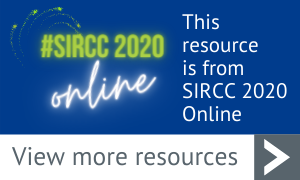SIRCC 2020 Online | Reflections on COVID-19
Topic: Residential care, SIRCC
Author: CELCIS
Here we have gathered together in one place published examples of the extraordinary ordinary in residential child care during the public health emergency and lockdown. What changes or alternative ways of working have taken place, how did the voices of young people form decisions, and how have people been coming together to help to sustain relationships and offer some stability for young lives during these uncertain times?
A mixture of blogs, Meeting the Challenge articles, and Scottish Journal of Residential Child Care special articles from both Scotland and internationally that CELCIS has published recently.

Involving young people in COVID-19 Route Mapping | How the Good Shepherd Centre involved young people on their Covid-19 Route Mapping
The COVID-19 lockdown changed the day to day lives of young people at Good Shepherd Centre (GSC). To keep everyone safe in their care houses and school GSC introduced physical distancing and smaller learning groups. This meant young people not being able to spend time with friends from other houses on campus, the school day was shortened and there were additional pressures from living and learning alongside the same group of young people for an extended period of time.
Supporting young people to connect with each other through digital get-togethers | How the young people at Aberlour came together during lockdown
A young person said he was feeling bored and lonely and could he start an online quiz between the eight houses Aberlour runs across Scotland. The idea took off and young people took the lead, suggesting more events including a talent show, karaoke, and a TikTok dance night.
A residential practitioner steps in to provide a temporary home | How a residential practitioner at Glasgow City Council offered a young person a place to stay so she could take up a new job
During the height of the lockdown restrictions, 17-year-old Daisy*, who lives at the Monreith Road Care Home for children and young people, secured a new job at an elderly care unit. While she was excited to start, during the induction she found out that a number of residents at the elderly care unit had tested positive for COVID-19, and it became apparent that working at the unit would be high risk both for her and for the other children and staff at Monreith Road,
How young people spread kindness and positivity in their community during COVID-19 | How young people at Rossie Young People's Trust helped their local community to feel more connected during lockdown
COVID-19 meant Rossie's campus had to make adjustments which had a major impact on young people's day-to-day lives. This included being unable to do outdoor activities, visit home, or see family and friends face-to-face, and, during school hours and in their free time, only being able to spend time with those they live with, no other young people from the campus. This meant a new way needed to be found to support the young people and provide some positivity during these uncertain times.
Technology steps in to keep relationships going during COVID-19 | How Kibble, a specialist provider of services for young people facing adversity, is using technology to sustain relationships
During lockdown restrictions physical, face-to-face meetings could no longer take place at Kibble, impacting visits from young people's families, social workers, advocates, and other important meetings. Kibble sought ways to ensure children and young people retained vital contact with their families, social workers, and advocates, as well as identifying ways to support remote meetings.

'Problem posing' during the COVID19 pandemic: Rethinking the use of residential childcare
Author: Joe Gibb, Scotland
Starting a new residential childcare service can be a daunting task at the best of times and, even more daunting during the wake of a global pandemic. In this article Joe Gibb, residential service manager at Taigh Araich which opened in March 2020, provides an overview of some of the learning that has taken place during the past five months. Joe concludes by arguing that social pedagogy and the GIRFEC (Getting It Right For Every Child) national practice model in Scotland, have an excellent fit in which a new residential childcare paradigm could emerge as society begin to make sense of the new normal that awaits its citizens.
COVID-19: Survey of residential services in Ireland during the lockdown restrictions
Author: John Murphy, Ireland
Resulting from the outbreak of COVID-19 and the subsequent lockdown, EPIC (Empowering People in Care), decided to contact all young people's residential centres in Ireland to ensure that their issues were being heard. The survey concentrated on the needs of the young people, issues affecting staff, how work practices had changed and what extra supports were needed. The responses were positive on many levels and certainly the voices of the young people and the staff were heard.
Young people in care: How lockdown provides a haven of security and belonging
Author: Claire Cameron, Scotland
Amidst all the gloom and concerns about what effect the emergency lockdown is having on children, there is a small group of young people finding positive benefits. Staff at one Scottish residential service for children and young people who have complex needs, say young people are less distressed than before lockdown and many seem happier than they were before the measures were implemented. Daily life is less pressured. Staff are happier too. Lockdown is proving to be a catalyst for changes in line with the principles of Social Pedagogy which promotes the value of meaningful relationships that offer emotional and practical support
Seeing the silver lining in the cloud: Resiliency demonstrated by children in residential care in India during the COVID-19 crisis
Author: Kiran Modi, India
The main priority during the COVID-19 emergency for Udayan Care, an NGO based in Delhi, India, is to quickly assess the risks and take steps to mitigate them so that the children and youth in the care system, and care leavers, already unsupported, do not succumb to the harsh realities caused by the pandemic. This article describes ways in which children and staff have been adapting to the difficult circumstances they are facing.
Supporting the emotional wellbeing of adults in child care settings during the COVID-19 pandemic
Author: Shona Quin and Penelope Noel, Scotland
In order to provide an emotionally responsive environment for young people in care, we must turn our attention to the emotional wellbeing of the adults who look after them. This includes introducing processes within the workplace that can be adopted to support the development of self-care, such as developing skills in self-awareness, emotional literacy, and regulation, enabling adults to be emotionally present and responsive to the needs of young people. This article reflects on the introduction of supervision, reflective practice and consultation within Aberlour Sycamore Services in Scotland, summarising a recent evaluation of these structures.
Fear Uncertainty and Relational Care in the Face of COVID-19
Author: James Freeman, USA
This article was first published in the April 2020 issue of CYC-Online.
The COVID-19 pandemic is testing our resilience and our ways of living and being together. Being open about the fear this situation has caused is the first step in how to handle what is happening to us, Those caring for others have a role in holding their fear. This doesn't mean denying the threat is real, but means being honest, sensitive, and transparent with ourselves and others. In this challenging time, children in care need more of us than perhaps we think it is possible to give. They don't need us to panic or give in to our own sense of overwhelm. They need us to show love and be a source of strength.

COVID-19 – An opportunity to connect with time
Elaine Hamilton is the Service Manager at Nether Johnstone House, a residential home in Renfrewshire. Here she describes how lockdown due to the current emergency health crisis has changed the thinking, outlooks, and actions of both the young people and the team that surround them.




